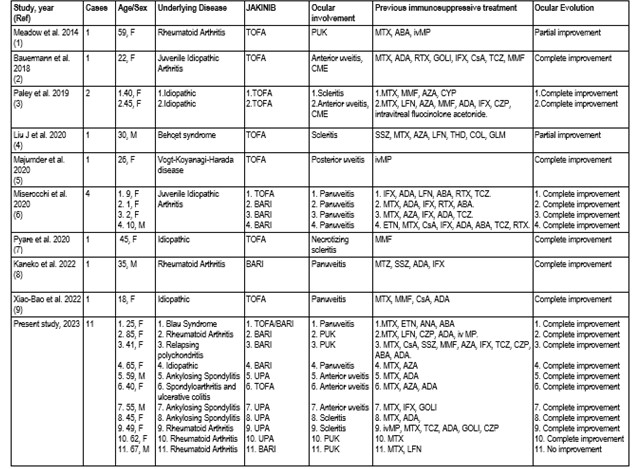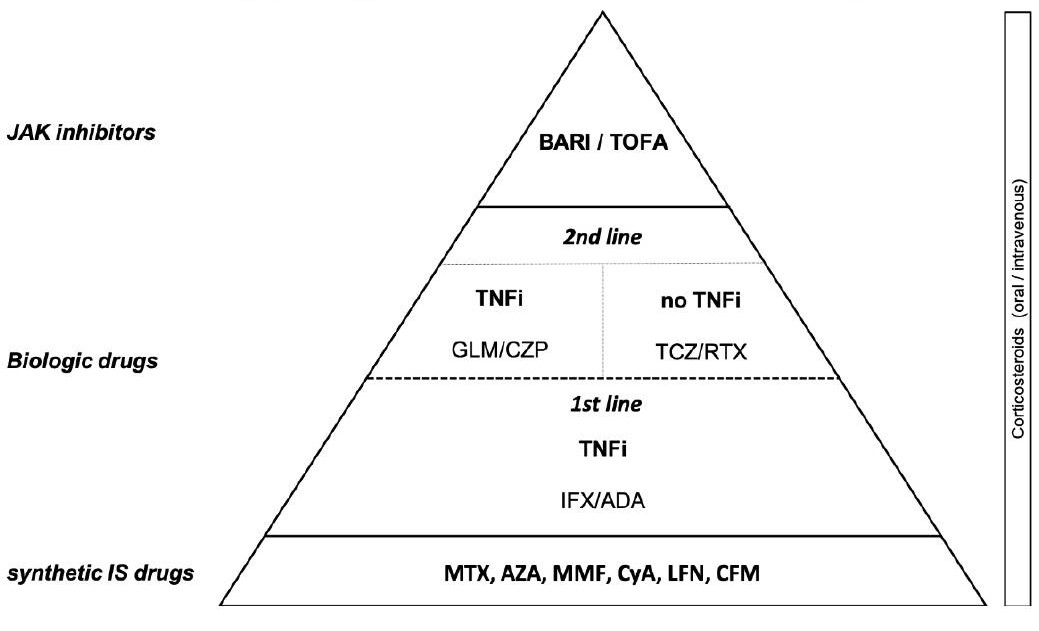Session Information
Date: Monday, November 13, 2023
Title: (1124–1154) Miscellaneous Rheumatic & Inflammatory Diseases Poster II
Session Type: Poster Session B
Session Time: 9:00AM-11:00AM
Background/Purpose: Inflammatory ocular pathology (IOP) includes internal (uveitis) and external [mainly ocular surface pathology such as epi/scleritis and peripheral ulcerative keratitis (PUK)] involvement. IOP may be severe ocular conditions refractory to conventional immunosuppressants and even biological therapy. Janus Kinase inhibitors (JAKINIB) had shown efficacy in refractory cases of different immune-mediated inflammatory diseases (IMID).
In patients with refractory IOP treated with JAKINIB our aims were a) to assess the patients of Spanish referral centers, b) Literature review.
Methods: Multicenter study of 11 patients with refractory IOP treated with JAKINIB. For Literature review a search was conducted in PubMed, Embase and the Cochrane library from their inception to 1st January 2023. Original research articles studying JAKINIB treatment in patients with IOP were included. In addition, a therapeutical approach of refractory IOP is proposed.
Results: We have identified 11 cases in eight University Hospitals and 13 cases in the literature review. These 24 patients (17 women/ 7 men) (35 affected eyes), mean age 38.9±21.9 years, had different refractory IOP (uveitis=14; scleritis=5, PUK=5). Most of IOP were associated with IMID (n=19, 79.2%) while 5 cases (20.8%.), were idiopathic. The main underlying IMID were rheumatoid arthritis (n=6, 25%), juvenile idiopathic arthritis (n=5, 20.8%) and spondyloarthritis (n=4; 16.7%) (TABLE). Uveitis (n=14) followed by ocular surface pathology (n=10) were the most frequent subtypes of IOP. Patterns of uveitis were panuveitis (n=8), anterior uveitis (n=5; 2 of them with Cystoid macular), and posterior (n=1). Ocular surface pathology was due to scleritis (n=5) and PUK (n=5). In addition to systemic corticosteroids, before JAKINIB, conventional (n= 23; 95.8%) and biologicalimmunosuppressive drugs (n=18; 75%) were required. The JAKINIB most widely used was tofacitinib (n= 11; 45.8%) followed by baricitinib (n=8; 33.3%). In one patient with Blau Syndrome and uveitis, tofacitinib was switched to baricitinib due to severe lymphopenia.In two other patients, UPA was discontinued due to anemia and skin adverse reaction. Finally, only in one patient baricitinib was withdrawn due to lack of improvement. After starting JAKINIB treatment, 23 patients presented clinical improvement, complete (n=21, 87.5%) or partial (n= 2; 8.3%). Based on these data a therapeutical approach of refractory IOP was proposed (FIGURE).
Conclusion: JAKINIB may be an effective and safe therapy in IOP refractory to conventional or even biological immunosuppressive therapy.
To cite this abstract in AMA style:
Lasa-Teja C, Sanchez-Bilbao L, Martin-Varillas J, Calvo Río V, Álvarez-Vega J, Beltran-Catalan E, Esteban-Ortega M, Muñoz S, Maiz O, Torre-Salaberri I, Urruticoechea A, Valls-Pascual E, Veroz R, Alvarez Reguera C, Demetrio R, Blanco R. Refractory Inflammatory Ocular Pathology and Treatment with Janus Kinase Inhibitors. Multicenter Study and Literature Review [abstract]. Arthritis Rheumatol. 2023; 75 (suppl 9). https://acrabstracts.org/abstract/refractory-inflammatory-ocular-pathology-and-treatment-with-janus-kinase-inhibitors-multicenter-study-and-literature-review/. Accessed .« Back to ACR Convergence 2023
ACR Meeting Abstracts - https://acrabstracts.org/abstract/refractory-inflammatory-ocular-pathology-and-treatment-with-janus-kinase-inhibitors-multicenter-study-and-literature-review/


